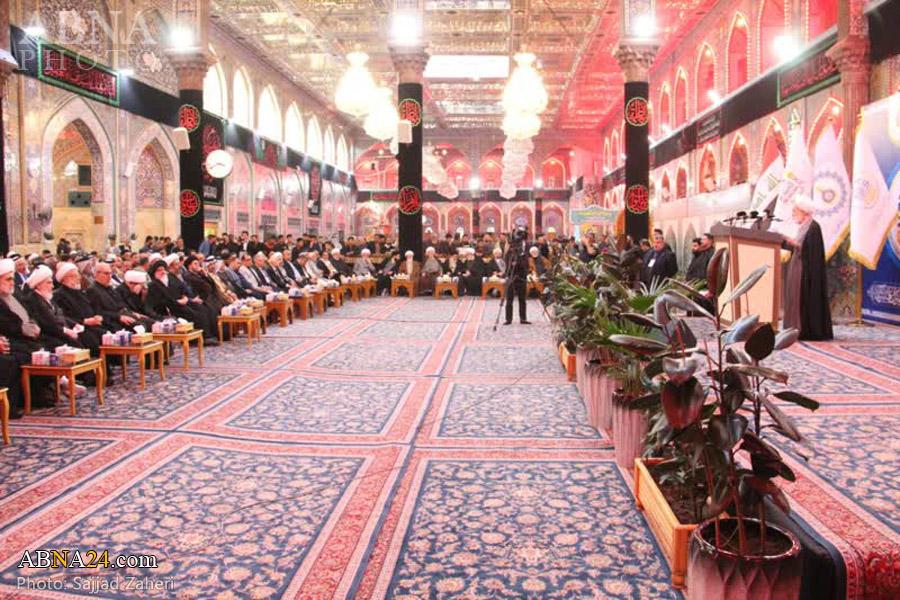AhlulBayt News Agency (ABNA): Allameh Abd al-Hussain Sadiq stated, “Mirza Mohammad Taghi Shirazi’s fatwa and his leadership in the Iraqi Revolution in 1920 are not exceptional. Rather, they are considered as the following the way of Shiite clerics and Marjaiat in fighting oppression and perversion. The fatwa of the Great Mirza Shirazi to boycott tobacco against British colonialism, the fatwa of Ayatollah Sayed Mohsen Hakim to confront communism in Iraq, the Islamic Revolution by Imam Khomeini against the oppression of the Shah of Iran, the fatwa of Ayatollah Khoei against Saddam in the Shabaniyah intifada (1991 Uprising in Iraq), and the historical fatwa of Ayatollah Sistani, which saved Iraq from Takfiri terrorism are examples of this leadership of the Shiite clerics.”
The opening ceremony of the Conference to Commemorate Grand Ayatollah Mirza Mohammad Taghi Shirazi was held on Saturday, December 10, 2022.
The ceremony was held in the Holy Shrine of Imam Hussain (a.s.) in Karbala with the large presence of ulama, clerics, national and military figures, chiefs and sheikhs of tribes, researchers and professors from the universities of Iraq, Iran and a number of other countries of the world.
The fifth speaker of the opening ceremony of the Conference to Commemorate Grand Ayatollah Mirza Mohammad Taghi Shirazi was a prominent figure from Lebanon.
In his speech, Allameh Sheikh Abd al-Hussain Sadiq, the professor of the higher levels of seminaries in South Lebanon, while describing Mirza Shirazi as the Marja of the Ummah and the banner of piety, stated, “The name of Mirza Shirazi is associated with the uprising of 1920.”
“Mirza Shirazi’s uprising in the 1920 Iraqi Revolution was a sign of the ulama sense of responsibility for the fate of their people and country,” he said, “His fatwa led to the independence of Iraq and the establishment of brotherhood between Shiites and Sunnis.”
“The Iraqi people felt that they had to stand against the British occupation and therefore national movements started. Until Mirza Shirazi took the leadership with wisdom and tact. His action was far from power seeking and violence. However, he issued the Sharia permission to use force, when it was necessary, to fight against the invaders and colonizers,” Sheikh Abd al-Hussain Sadiq continued.
“In the following, the people of different regions of Iraq accepted Mirza’s invitation and rose up with Mirza’s support. Elders of seminaries and ulama such as Ayatollah Sayed Kazem Yazdi, Sayed Mohsen Hakim, and Sayed Abu al-Qasim Khoei also supported the fatwa of this popular Marja,” the Lebanese religious intellectual added.
“Martyrdom was the fate of the Mujahid life of Mirza Mohammad Taghi Shirazi. He was poisoned by British security forces and martyred,” he said.
“Mirza Mohammad Taghi Shirazi’s fatwa and his leadership in the Iraqi Revolution in 1920 are not exceptional,” Allameh Abd al-Hussain Sadiq stated, “Rather, they are considered as the following the way of Shiite clerics and Marjaiat in fighting oppression and perversion. The fatwa of the Great Mirza Shirazi to boycott tobacco against British colonialism, the fatwa of Ayatollah Sayed Mohsen Hakim to confront communism in Iraq, the Islamic Revolution by Imam Khomeini against the oppression of the Shah of Iran, the fatwa of Ayatollah Khoei against Saddam in the Shabaniyah intifada (1991 Uprising in Iraq), and the historical fatwa of Ayatollah Sistani, which saved Iraq from Takfiri terrorism are examples of this leadership of the Shiite clerics.”
“The conduct of the great Shiite ulama have been to influence the power, without being influenced by it, and without propaganda. They came to help Islam,” he continued.
This Lebanese seminary professor considered Ayatollah Sistani’s support for Palestinian Cause and its oppressed people as the continuation of the same Jihadi conduct of Shiite ulama.
* The Series of International Conferences for the Revival of the Heritage of the Ulama of Karbala
It should be mentioned that the Commemoration Conference for Ayatollah Mirza Mohammad Taghi Shirazi is the third of the Series of International Conferences for the Revival of the Heritage of the Ulama of Karbala which dedicated to commemorating and revival the works of the ulama of Karbala.
The organizer of these series of conferences is the Karbala Center for Studies and Research, the Scientific Section of the Holy Shrine of Imam Hussain (a.s.). Previously, Karbala Center held the first and second conferences to commemorate Allameh Vahid Behbahani, and great faqih and hadith narrator Ibn Fahd Hilli.
The title of the 3rd conference of these Series of International Conferences, was “Ayatollah Mirza Mohammad Taghi Shirazi - Thoughts and Leadership”, which was held by Research Center of the Holy Shrine of Imam Hussain (a.s.) in cooperation with the Shiraz University as partner organizer.
The opening ceremony of this conference was held in the Holy Shrine of Imam Hussain (a.s.) on Saturday, December 10, 2022, and then, after Maghrib and Isha prayers, researchers from different countries presented their articles in the evening scientific session which was held in Sayed al-Osia Complex.
On Sunday morning, December 11, 2022, the scientific session continued their activities, and the closing ceremony was held on Sunday evening.
It is also worth mentioning that the ABNA News Agency by dispatching reporters covered the detailed news and pictures of this conference exclusively.
.........................
End/ 345

